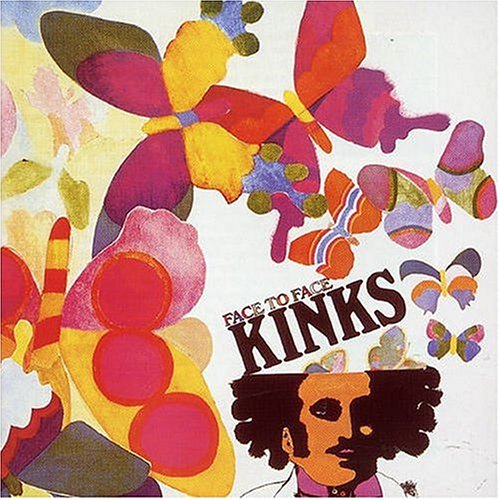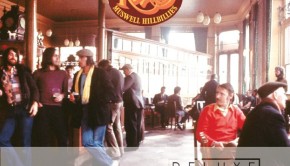
Review: The Kinks – Face to Face (Deluxe Edition)
Published on June 28th, 2011 | Jonny Abrams
1966 and all that, what? Revolver, Pet Sounds, a Russian linesman: all fully deserving of the ‘landmark’ status they’ve since been afforded, but what of Face to Face?
The lingering under-appreciation of The Kinks is such that Ray Davies can now enjoy a quiet drink in his local without many of his fellow punters realising that they are in the presence of a songwriter every bit the equal of Messrs Lennon, McCartney and Wilson (although he’s a poor second to Sir Geoff Hurst in the centre-forward stakes).
This was certainly the case when this writer came across him in a north-London pub and bought his whole table a drink while spluttering something about ‘Big Sky’ being the best song ever.
“Who was that you were talking to?” a stranger asked me outside. “Ray Davies!” I replied, still buzzing with excitement at meeting my hero, albeit briefly. “Ah…” said the stranger, “…who?”
“You met Craig David?” replied at least one of the friends I told of this meeting, the majority of those polled requiring an explanation as to precisely who this bloke was and is. “The singer of The Kooks?” asked another.
“No. Not The bloody Kooks.”
Time may not have forgotten Davies’ most celebrated compositions – ‘You Really Got Me’, ‘Waterloo Sunset’, ‘Sunny Afternoon’ (featured here) and so on – but the current reissues of Face to Face, Something Else by The Kinks and Arthur or the Decline and Fall of the British Empire provide timely reminders that The Kinks were at their peak way more than just a singles band.
Beginning with Face to Face and arguably culminating with 1971’s Muswell Hillbillies, The Kinks embarked on a six-album run that you’d be hard pressed to find the equal of in popular music history. Opening salvos such as ‘You Really Got Me’ and ‘All Day and All of the Night’ established Davies and co as a pioneering proto-punk reference point – Dave Davies’ tampered-with guitar amp introducing the rush of wild distortion into mainstream rock and roll – but the run of obligatorily cover-heavy early albums was brought to a halt by Face to Face, which featured only Ray’s home-cooked material.
It’s not hard to see how this shift came about. With the twin successes of ‘A Well Respected Man’ and the Dave-lampooning ‘Dedicated Follower of Fashion’, Ray had not only stumbled into a devastating (and prolific) run of songwriting form but also a formula that could renew his band’s appeal. They’d already done the rock thing, so when these two bouncy, wryly observational singles hit the bull’s eye – and were subsequently split in twain by the laser-guided genius of ‘Sunny Afternoon’ – it was clear where The Kinks had to go next.
However, it wasn’t an easy transition to make, Ray suffering a nervous breakdown just before going into the studio for the album’s major recording sessions. Consensus attributes this breakdown to the various pressures placed on his precocious shoulders by label and management alike, and this logic has been extrapolated into the suggestion that these pressures prompted Ray’s shift into narrative songwriting as a form of escapism, whittling the world he saw around him into three-minute pop nuggets and internalising only on the self-explanatory ‘Too Much on My Mind’.
This latest reissue of Face to Face comes with a bonus CD of stereo mixes, offering another opportunity for reappraisal; however, happily, none is required. If you like your music to be kept clean, head straight for this second disc but bear in mind that the added spaciousness drains some of the ramshackle charm from what are not exactly flawless performances (although the musicianship is generally excellent). For the full Kinks experience, Rocksucker recommends that you stick with the dirtier, raspier mono versions of the first disc.

Opening track ‘Party Line’ begins with the ring of a telephone followed by a “Hello, who’s that speaking, please?” courtesy of the band’s well-spoken manager Grenville Collins, offering some insight into Ray’s original plan to link the tracks together with sound effects, an idea which was rebuked by Pye Records. A playful rockabilly number sung by Dave, ‘Party Line’ is ostensibly about the irritation of sharing a telephone line with another household but could be interpreted as a telltale sign of Ray’s descent into paranoia. That may be reading too much into what is essentially a throwaway pop song but then jauntiness punctured by the odd party-pooper line was such a feature of Ray’s songwriting that who other than him could say?
The album then moves on to ‘Rosie Won’t You Please Come Home’, written from the point of view of a mother pining for the return of her emigrated daughter (are we right in thinking that Ray and Dave did indeed have a sister called Rosie who moved to Australia with a fellow named Arthur?). A more minor key affair infused with twinkling harpsichord, Ray’s typically honeyed croon offers to “bake a cake if you tell me you are on the next plane home”, a line which singlehandedly encapsulates the sadness, longing and parochial quaintness that this track so masterfully wields. By the time the mother figure is offering to “sacrifice all I have to have a happy home once more”, you feel like flying over there and bringing Rosie home yourself.
Third track ‘Dandy’ is of course about a cad and a bounder whose “little life” revolves solely around “chasing all the girls” who can’t resist his charm, “knocking on the back door, climbing through the window” in order to capitalise on the fact that “hubby’s gone away”. The major key bounciness of the song could almost fool you into thinking that Ray is condoning this underhanded practice were it not for the sneering vocal delivery and the warning contained in the middle eight: “When you’re old and grey, you will remember what they said / That two girls are too many, three’s a crowd and four yer dead”.
Despite figuring so early in the running order, ‘Too Much on My Mind’ – again assisted by that twinkly harpsichord – feels like a centrepiece, with Ray drawing from his own state of mind for the lyrics, which verge on being sighed: “There’s too much on my mind / And I can’t sleep at night thinking about it”. It’s so plaintively beautiful that the hammering harpsichord intro of next track ‘Session Man’ comes as something of a wake-up call.
A playful dedication to Nicky Hopkins, purveyor of said harpsichord and indeed a session man par excellence, lines such as “A rock and roll or folk group star / A Philharmonic orchestra / Everything comes the same to him” make for the kind of intelligently witty portrait that only Ray Davies was capable of conjuring. “He reads the dots and plays each line / And always finishes on time / No overtime nor favours done” almost seems as if Ray has an axe to grind but it’s so upbeat and rocking that it’s hard to see ‘Session Man’ as anything other than a send-up borne of fondness.
Sixth track ‘Rainy Day in June’ could barely be more apt given that there’s a thunderstorm happening as I write this, and it’s another one where you wonder how much of it to attribute to Ray’s state of mind at the time. The lyrics paint a fantastical yet grim spectre – “The demon stretched its crinkled hand and snatched a butterfly / The elves and gnomes were hunched in fear, too terrified to cry” – a paradox which matches the song’s title and, quite possibly, the idea of Ray suffering a breakdown while at the peak of his powers as a celebrated and beloved rock star.
Metaphorical confessional or ugly fairytale? Either way, it’s delightfully unsettling and works well as an otherworldly prelude to Face to Face‘s grounded middle section.The 1-2-3 hit of ‘A House in the Country’, ‘Holiday in Waikiki’ and ‘Most Exclusive Residence for Sale’ sees Ray going all-out for narrative centred around themes such as failure, disillusionment and rampant commercialisation. Respectively, they deal with an objectionable and materialistic nouveau riche, a competition-winner’s trip to Hawaii which is marred by the blatant inauthenticity of the destination (“In a little shack, they had a little sign that said ‘Coca Cola’ / And even all the grass skirts were PVC”), and another nouveau riche – the same chap, perhaps? – who has squandered his new-found wealth foolishly and takes to the bottle as his luxury lifestyle vanishes before him.
Of course, some of these themes are revisited in monumental penultimate track ‘Sunny Afternoon’, but not before the Eastern mysticism of ‘Fancy’, the understatedly heartbreaking ‘Little Miss Queen of Darkness’ (“The only boy she had went and coolly stepped aside / And Little Miss Queen of Darkness might as well have died” gets me every time) and the vacuous, Dave-sung ‘You’re Lookin’ Fine’, which one can only imagine was an old composition revisited unless an exercise in rock cliché was the whole point; in which case, job well done.
Face to Face draws to a close with ‘I’ll Remember’, another that has more in common with The Kinks’ earlier output but with far more substance than ‘You’re Looking Fine’, steeped as it is in fond nostalgia. It’s a pleasant comedown from the majesty of ‘Sunny Afternoon’ and segues nicely into the bonus material present on this latest reissue.
The familiar parping trumpet of contemporary single ‘Dead End Street’ introduces a song every bit as powerful as ‘Sunny Afternoon’ and, while it had some success, it is rather a mystery that “There’s a crack up in the ceiling and the kitchen sink is leaking” didn’t wind up as seminal an opening line as “The taxman’s taken all my dough”. One of many Kinks high points not to feature on an album proper, ‘Dead End Street’ boasts the kind of shouty chorus, barrelhouse piano, gallows humour and everyman call-to-arms that should have had people calling for it to be an unofficial national anthem. It is simply masterful.’Big Black Smoke’ isn’t quite as effective a portrayal of murky urban life but it is still a fine thing indeed, with its general London sound effects providing another hint into Ray’s original concept. ‘This is Where I Belong’ is a misnomer insomuch as it deserves far more than its status as a bonus track; in fact, it’s another cast-iron classic, Ray at his reflective best between flute-y trills so heart-warming that it could end wars if it was only given the chance to. “I won’t search for a house upon a hill / Why should I when I’d only miss you still?” – perhaps that breakdown made Ray realise what was truly important to him in life, and that the high life available to him as a rock star just wasn’t for him.
Final bonus track (not including the various alternative versions, that is) ‘She’s Got Everything’ is charming enough in its breezy, ivory-tinkling, drum-fill-happy way but can be filed alongside ‘Big Black Smoke’ as a respectable second to the should-be classics of ‘Dead End Street’ and ‘This is Where I Belong’. Overall, there’s more than enough first-rate material on here to explore before diving into the Deluxe Edition of Something Else by The Kinks (click here for our review of that), in which the unlikely bedfellows of vaudeville and psychedelia begin to creep in, and Mick Avory and Pete Quaife start to come into their own as musicians…
Rocksucker says: Four and a Half Quails out of Five!





Face to Face (Deluxe Version) is out now on Sanctuary Records. For all the very latest on The Kinks and Ray Davies, please visit the unofficial yet comprehensive fan site kindakinks.net – it also has the best collection of Kinks chords and tabs out there by a country mile!




















One Response to Review: The Kinks – Face to Face (Deluxe Edition)